Analysis of SMEs, Entrepreneurial Ventures and Economic Impact Report
VerifiedAdded on 2023/01/09
|17
|4528
|92
Report
AI Summary
This report provides a comprehensive analysis of Small and Medium Enterprises (SMEs) and various entrepreneurial ventures. It begins by defining the concept of SMEs and their significant contributions to the UK economy, including employment generation and GDP growth. The report delves into the role of SMEs, comparing their impact across different UK regions and industries, as well as in two EU countries. It then explores different types of entrepreneurial ventures, highlighting their similarities and differences. Further, the report examines the characteristics of entrepreneurs and their correlation with success, evaluating factors that foster or hinder entrepreneurial endeavors. The report concludes with a critical evaluation of the factors influencing entrepreneurial success, offering valuable insights into the dynamics of business management and economic impact.
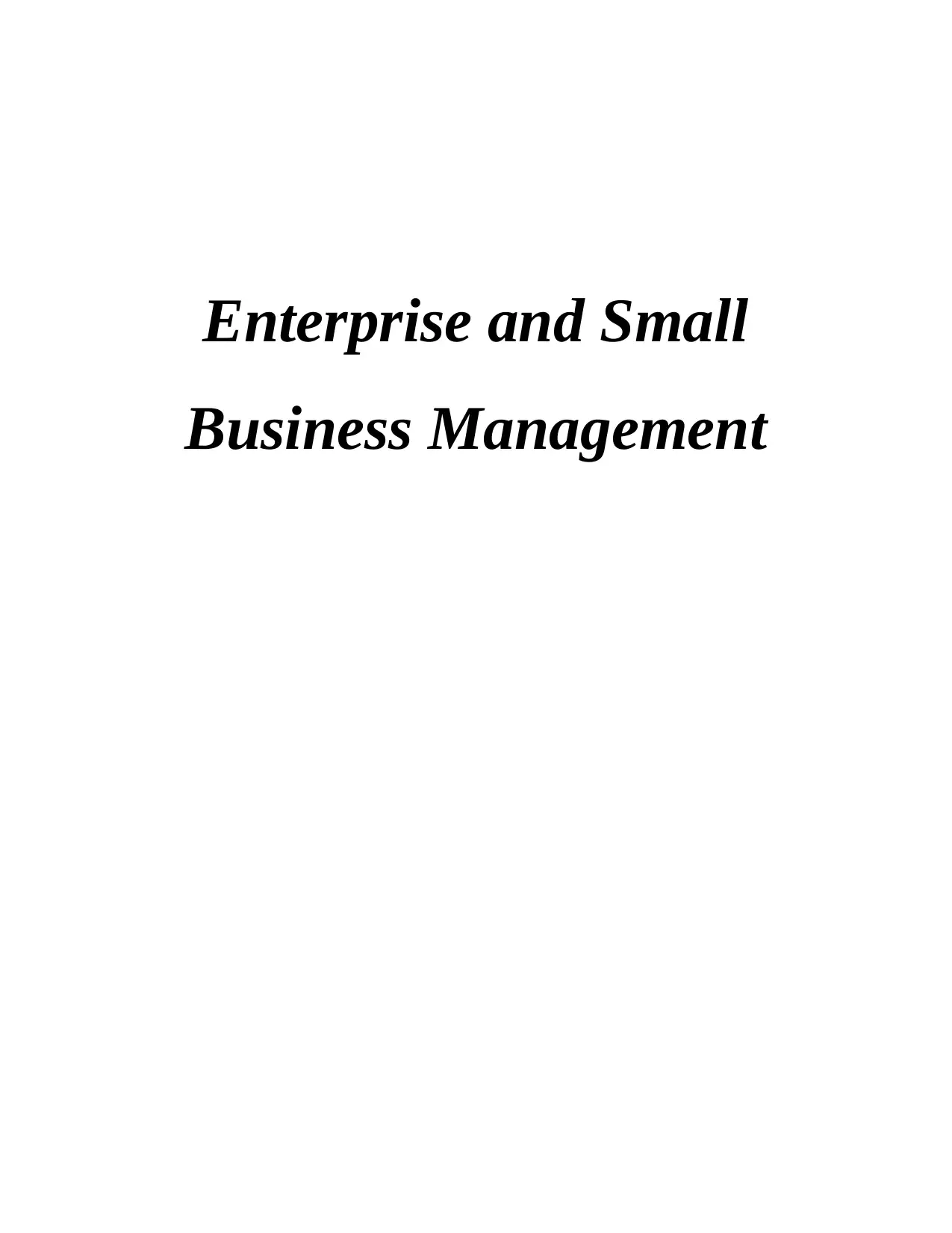
Enterprise and Small
Business Management
Business Management
Paraphrase This Document
Need a fresh take? Get an instant paraphrase of this document with our AI Paraphraser
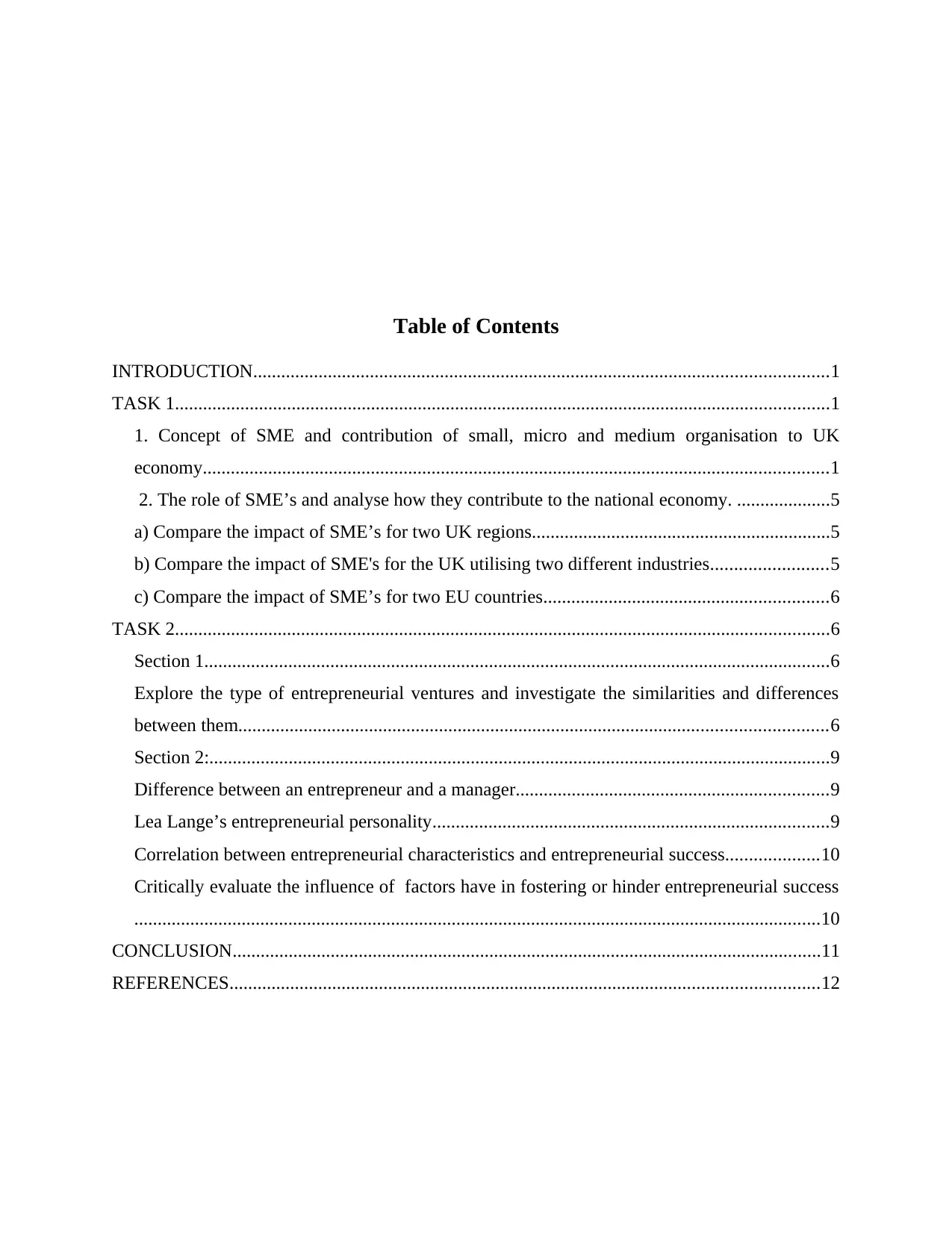
Table of Contents
INTRODUCTION...........................................................................................................................1
TASK 1............................................................................................................................................1
1. Concept of SME and contribution of small, micro and medium organisation to UK
economy......................................................................................................................................1
2. The role of SME’s and analyse how they contribute to the national economy. ....................5
a) Compare the impact of SME’s for two UK regions................................................................5
b) Compare the impact of SME's for the UK utilising two different industries.........................5
c) Compare the impact of SME’s for two EU countries.............................................................6
TASK 2............................................................................................................................................6
Section 1......................................................................................................................................6
Explore the type of entrepreneurial ventures and investigate the similarities and differences
between them..............................................................................................................................6
Section 2:.....................................................................................................................................9
Difference between an entrepreneur and a manager...................................................................9
Lea Lange’s entrepreneurial personality.....................................................................................9
Correlation between entrepreneurial characteristics and entrepreneurial success....................10
Critically evaluate the influence of factors have in fostering or hinder entrepreneurial success
...................................................................................................................................................10
CONCLUSION..............................................................................................................................11
REFERENCES..............................................................................................................................12
INTRODUCTION...........................................................................................................................1
TASK 1............................................................................................................................................1
1. Concept of SME and contribution of small, micro and medium organisation to UK
economy......................................................................................................................................1
2. The role of SME’s and analyse how they contribute to the national economy. ....................5
a) Compare the impact of SME’s for two UK regions................................................................5
b) Compare the impact of SME's for the UK utilising two different industries.........................5
c) Compare the impact of SME’s for two EU countries.............................................................6
TASK 2............................................................................................................................................6
Section 1......................................................................................................................................6
Explore the type of entrepreneurial ventures and investigate the similarities and differences
between them..............................................................................................................................6
Section 2:.....................................................................................................................................9
Difference between an entrepreneur and a manager...................................................................9
Lea Lange’s entrepreneurial personality.....................................................................................9
Correlation between entrepreneurial characteristics and entrepreneurial success....................10
Critically evaluate the influence of factors have in fostering or hinder entrepreneurial success
...................................................................................................................................................10
CONCLUSION..............................................................................................................................11
REFERENCES..............................................................................................................................12

⊘ This is a preview!⊘
Do you want full access?
Subscribe today to unlock all pages.

Trusted by 1+ million students worldwide
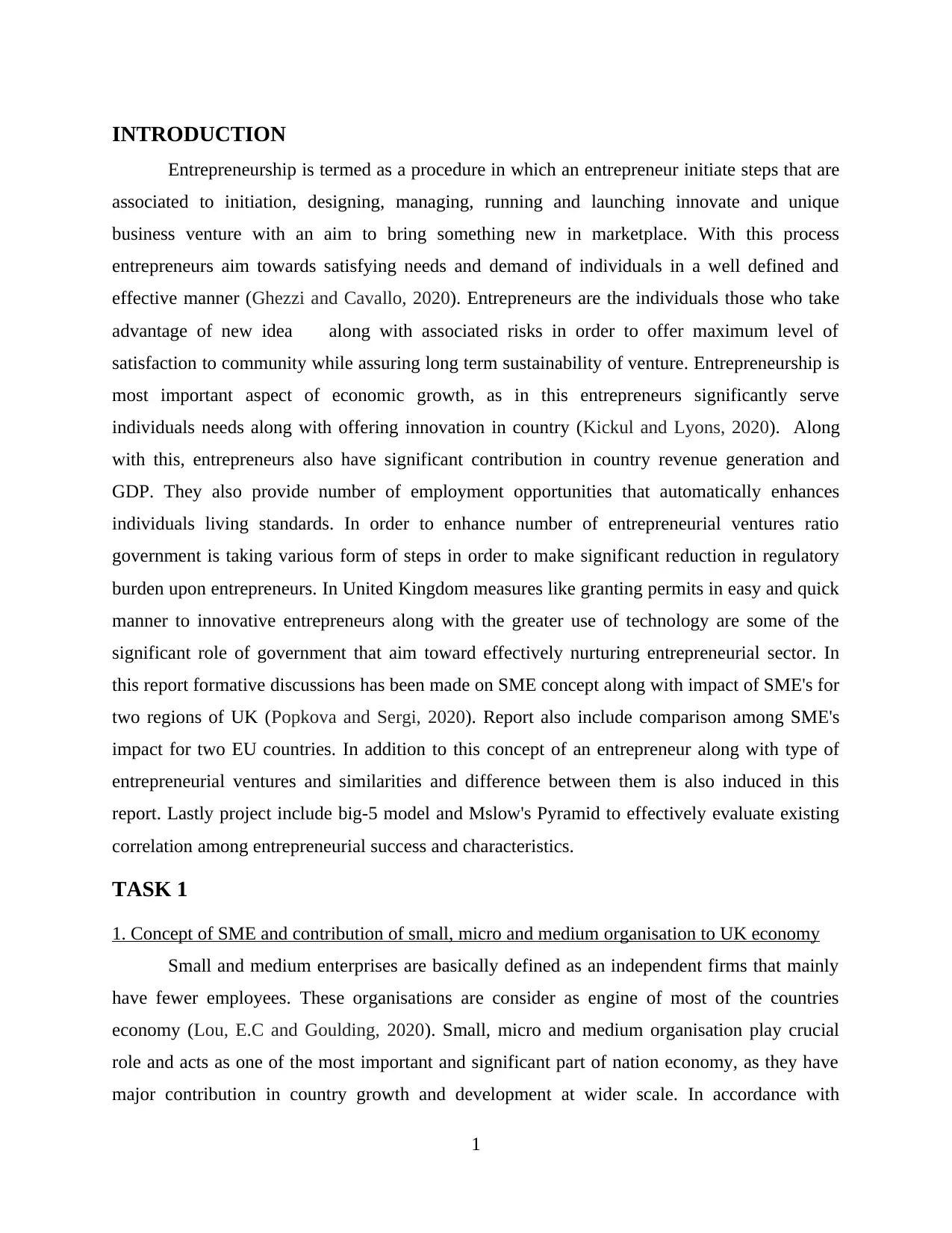
INTRODUCTION
Entrepreneurship is termed as a procedure in which an entrepreneur initiate steps that are
associated to initiation, designing, managing, running and launching innovate and unique
business venture with an aim to bring something new in marketplace. With this process
entrepreneurs aim towards satisfying needs and demand of individuals in a well defined and
effective manner (Ghezzi and Cavallo, 2020). Entrepreneurs are the individuals those who take
advantage of new idea along with associated risks in order to offer maximum level of
satisfaction to community while assuring long term sustainability of venture. Entrepreneurship is
most important aspect of economic growth, as in this entrepreneurs significantly serve
individuals needs along with offering innovation in country (Kickul and Lyons, 2020). Along
with this, entrepreneurs also have significant contribution in country revenue generation and
GDP. They also provide number of employment opportunities that automatically enhances
individuals living standards. In order to enhance number of entrepreneurial ventures ratio
government is taking various form of steps in order to make significant reduction in regulatory
burden upon entrepreneurs. In United Kingdom measures like granting permits in easy and quick
manner to innovative entrepreneurs along with the greater use of technology are some of the
significant role of government that aim toward effectively nurturing entrepreneurial sector. In
this report formative discussions has been made on SME concept along with impact of SME's for
two regions of UK (Popkova and Sergi, 2020). Report also include comparison among SME's
impact for two EU countries. In addition to this concept of an entrepreneur along with type of
entrepreneurial ventures and similarities and difference between them is also induced in this
report. Lastly project include big-5 model and Mslow's Pyramid to effectively evaluate existing
correlation among entrepreneurial success and characteristics.
TASK 1
1. Concept of SME and contribution of small, micro and medium organisation to UK economy
Small and medium enterprises are basically defined as an independent firms that mainly
have fewer employees. These organisations are consider as engine of most of the countries
economy (Lou, E.C and Goulding, 2020). Small, micro and medium organisation play crucial
role and acts as one of the most important and significant part of nation economy, as they have
major contribution in country growth and development at wider scale. In accordance with
1
Entrepreneurship is termed as a procedure in which an entrepreneur initiate steps that are
associated to initiation, designing, managing, running and launching innovate and unique
business venture with an aim to bring something new in marketplace. With this process
entrepreneurs aim towards satisfying needs and demand of individuals in a well defined and
effective manner (Ghezzi and Cavallo, 2020). Entrepreneurs are the individuals those who take
advantage of new idea along with associated risks in order to offer maximum level of
satisfaction to community while assuring long term sustainability of venture. Entrepreneurship is
most important aspect of economic growth, as in this entrepreneurs significantly serve
individuals needs along with offering innovation in country (Kickul and Lyons, 2020). Along
with this, entrepreneurs also have significant contribution in country revenue generation and
GDP. They also provide number of employment opportunities that automatically enhances
individuals living standards. In order to enhance number of entrepreneurial ventures ratio
government is taking various form of steps in order to make significant reduction in regulatory
burden upon entrepreneurs. In United Kingdom measures like granting permits in easy and quick
manner to innovative entrepreneurs along with the greater use of technology are some of the
significant role of government that aim toward effectively nurturing entrepreneurial sector. In
this report formative discussions has been made on SME concept along with impact of SME's for
two regions of UK (Popkova and Sergi, 2020). Report also include comparison among SME's
impact for two EU countries. In addition to this concept of an entrepreneur along with type of
entrepreneurial ventures and similarities and difference between them is also induced in this
report. Lastly project include big-5 model and Mslow's Pyramid to effectively evaluate existing
correlation among entrepreneurial success and characteristics.
TASK 1
1. Concept of SME and contribution of small, micro and medium organisation to UK economy
Small and medium enterprises are basically defined as an independent firms that mainly
have fewer employees. These organisations are consider as engine of most of the countries
economy (Lou, E.C and Goulding, 2020). Small, micro and medium organisation play crucial
role and acts as one of the most important and significant part of nation economy, as they have
major contribution in country growth and development at wider scale. In accordance with
1
Paraphrase This Document
Need a fresh take? Get an instant paraphrase of this document with our AI Paraphraser
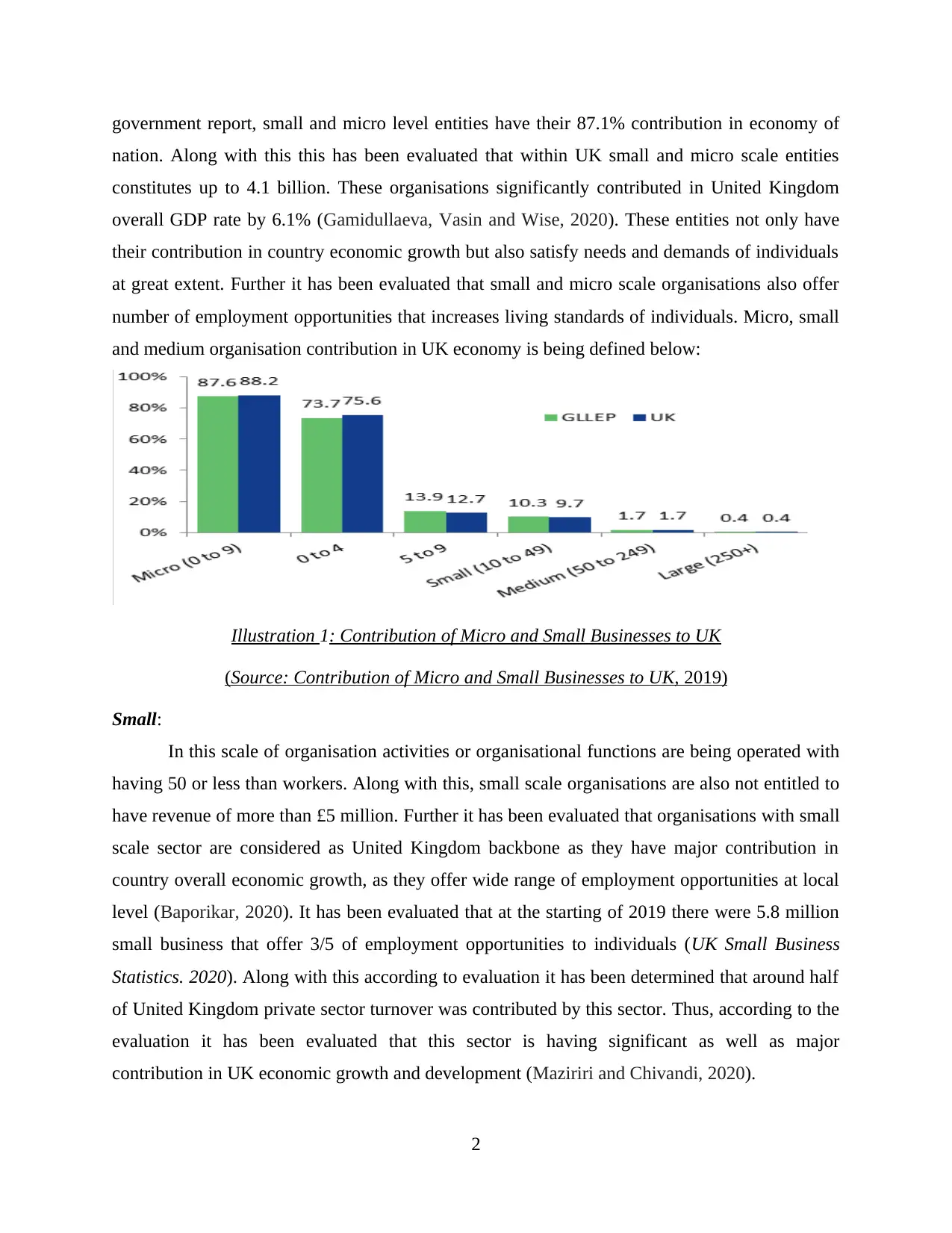
government report, small and micro level entities have their 87.1% contribution in economy of
nation. Along with this this has been evaluated that within UK small and micro scale entities
constitutes up to 4.1 billion. These organisations significantly contributed in United Kingdom
overall GDP rate by 6.1% (Gamidullaeva, Vasin and Wise, 2020). These entities not only have
their contribution in country economic growth but also satisfy needs and demands of individuals
at great extent. Further it has been evaluated that small and micro scale organisations also offer
number of employment opportunities that increases living standards of individuals. Micro, small
and medium organisation contribution in UK economy is being defined below:
Illustration 1: Contribution of Micro and Small Businesses to UK
(Source: Contribution of Micro and Small Businesses to UK, 2019)
Small:
In this scale of organisation activities or organisational functions are being operated with
having 50 or less than workers. Along with this, small scale organisations are also not entitled to
have revenue of more than £5 million. Further it has been evaluated that organisations with small
scale sector are considered as United Kingdom backbone as they have major contribution in
country overall economic growth, as they offer wide range of employment opportunities at local
level (Baporikar, 2020). It has been evaluated that at the starting of 2019 there were 5.8 million
small business that offer 3/5 of employment opportunities to individuals (UK Small Business
Statistics. 2020). Along with this according to evaluation it has been determined that around half
of United Kingdom private sector turnover was contributed by this sector. Thus, according to the
evaluation it has been evaluated that this sector is having significant as well as major
contribution in UK economic growth and development (Maziriri and Chivandi, 2020).
2
nation. Along with this this has been evaluated that within UK small and micro scale entities
constitutes up to 4.1 billion. These organisations significantly contributed in United Kingdom
overall GDP rate by 6.1% (Gamidullaeva, Vasin and Wise, 2020). These entities not only have
their contribution in country economic growth but also satisfy needs and demands of individuals
at great extent. Further it has been evaluated that small and micro scale organisations also offer
number of employment opportunities that increases living standards of individuals. Micro, small
and medium organisation contribution in UK economy is being defined below:
Illustration 1: Contribution of Micro and Small Businesses to UK
(Source: Contribution of Micro and Small Businesses to UK, 2019)
Small:
In this scale of organisation activities or organisational functions are being operated with
having 50 or less than workers. Along with this, small scale organisations are also not entitled to
have revenue of more than £5 million. Further it has been evaluated that organisations with small
scale sector are considered as United Kingdom backbone as they have major contribution in
country overall economic growth, as they offer wide range of employment opportunities at local
level (Baporikar, 2020). It has been evaluated that at the starting of 2019 there were 5.8 million
small business that offer 3/5 of employment opportunities to individuals (UK Small Business
Statistics. 2020). Along with this according to evaluation it has been determined that around half
of United Kingdom private sector turnover was contributed by this sector. Thus, according to the
evaluation it has been evaluated that this sector is having significant as well as major
contribution in UK economic growth and development (Maziriri and Chivandi, 2020).
2
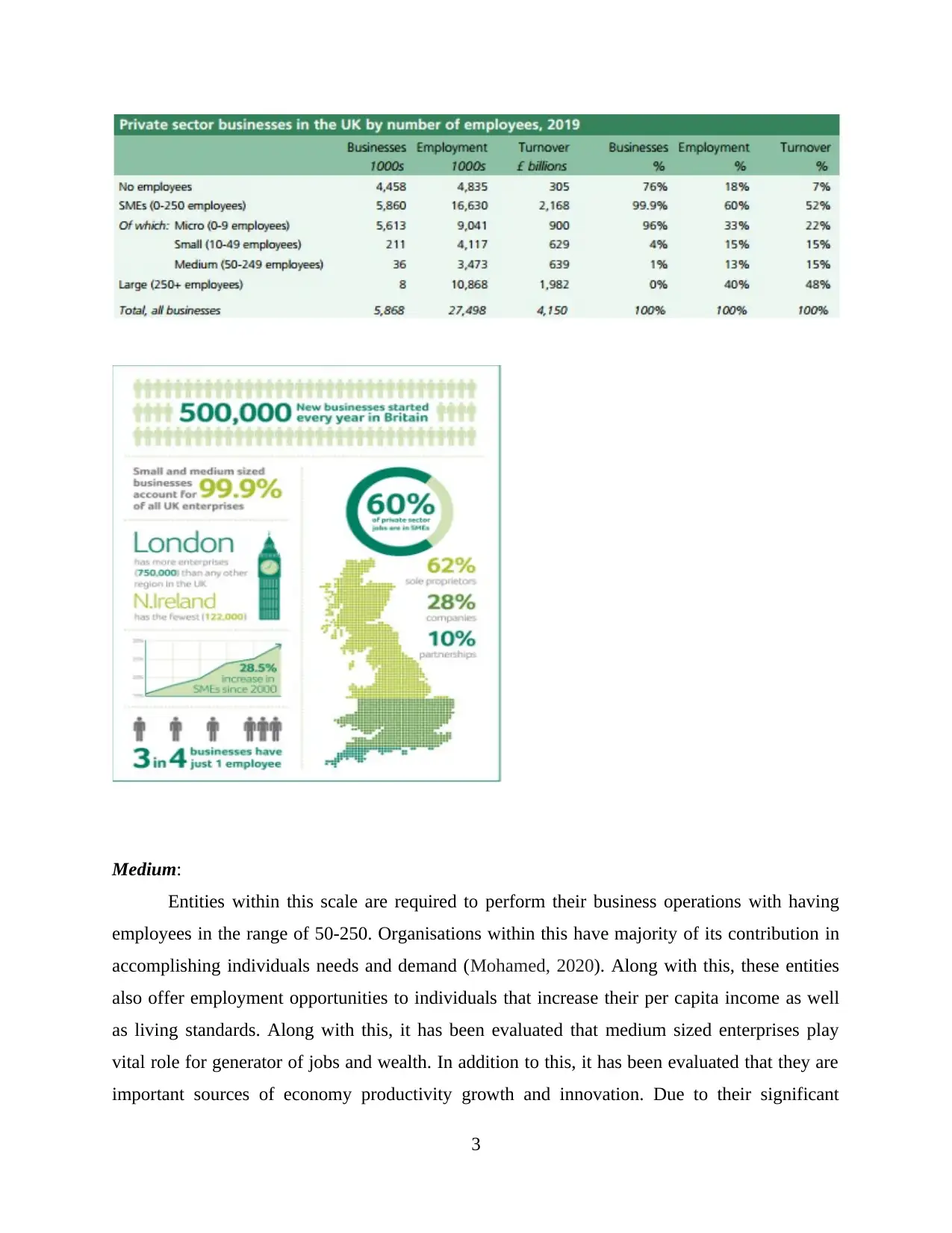
Medium:
Entities within this scale are required to perform their business operations with having
employees in the range of 50-250. Organisations within this have majority of its contribution in
accomplishing individuals needs and demand (Mohamed, 2020). Along with this, these entities
also offer employment opportunities to individuals that increase their per capita income as well
as living standards. Along with this, it has been evaluated that medium sized enterprises play
vital role for generator of jobs and wealth. In addition to this, it has been evaluated that they are
important sources of economy productivity growth and innovation. Due to their significant
3
Entities within this scale are required to perform their business operations with having
employees in the range of 50-250. Organisations within this have majority of its contribution in
accomplishing individuals needs and demand (Mohamed, 2020). Along with this, these entities
also offer employment opportunities to individuals that increase their per capita income as well
as living standards. Along with this, it has been evaluated that medium sized enterprises play
vital role for generator of jobs and wealth. In addition to this, it has been evaluated that they are
important sources of economy productivity growth and innovation. Due to their significant
3
⊘ This is a preview!⊘
Do you want full access?
Subscribe today to unlock all pages.

Trusted by 1+ million students worldwide
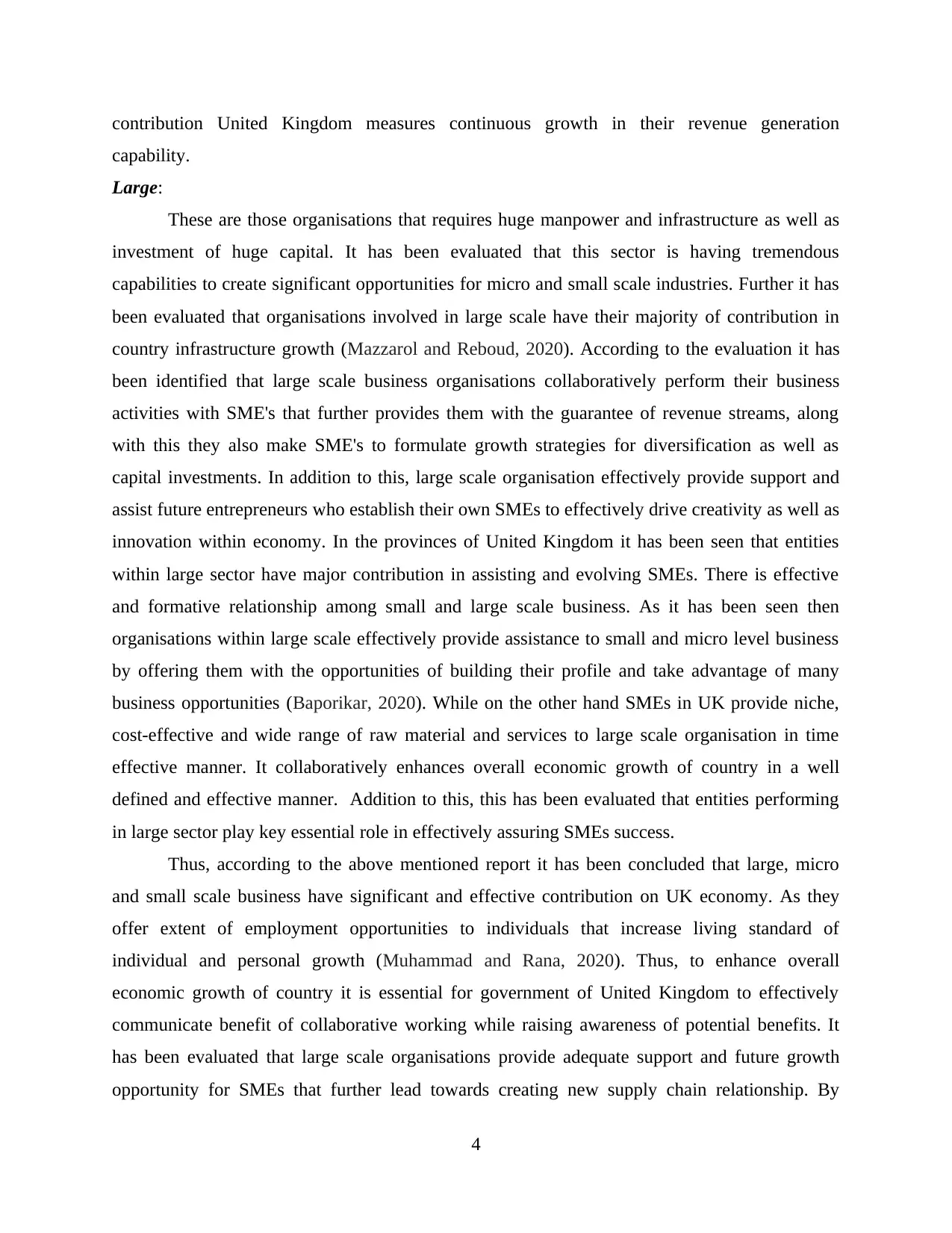
contribution United Kingdom measures continuous growth in their revenue generation
capability.
Large:
These are those organisations that requires huge manpower and infrastructure as well as
investment of huge capital. It has been evaluated that this sector is having tremendous
capabilities to create significant opportunities for micro and small scale industries. Further it has
been evaluated that organisations involved in large scale have their majority of contribution in
country infrastructure growth (Mazzarol and Reboud, 2020). According to the evaluation it has
been identified that large scale business organisations collaboratively perform their business
activities with SME's that further provides them with the guarantee of revenue streams, along
with this they also make SME's to formulate growth strategies for diversification as well as
capital investments. In addition to this, large scale organisation effectively provide support and
assist future entrepreneurs who establish their own SMEs to effectively drive creativity as well as
innovation within economy. In the provinces of United Kingdom it has been seen that entities
within large sector have major contribution in assisting and evolving SMEs. There is effective
and formative relationship among small and large scale business. As it has been seen then
organisations within large scale effectively provide assistance to small and micro level business
by offering them with the opportunities of building their profile and take advantage of many
business opportunities (Baporikar, 2020). While on the other hand SMEs in UK provide niche,
cost-effective and wide range of raw material and services to large scale organisation in time
effective manner. It collaboratively enhances overall economic growth of country in a well
defined and effective manner. Addition to this, this has been evaluated that entities performing
in large sector play key essential role in effectively assuring SMEs success.
Thus, according to the above mentioned report it has been concluded that large, micro
and small scale business have significant and effective contribution on UK economy. As they
offer extent of employment opportunities to individuals that increase living standard of
individual and personal growth (Muhammad and Rana, 2020). Thus, to enhance overall
economic growth of country it is essential for government of United Kingdom to effectively
communicate benefit of collaborative working while raising awareness of potential benefits. It
has been evaluated that large scale organisations provide adequate support and future growth
opportunity for SMEs that further lead towards creating new supply chain relationship. By
4
capability.
Large:
These are those organisations that requires huge manpower and infrastructure as well as
investment of huge capital. It has been evaluated that this sector is having tremendous
capabilities to create significant opportunities for micro and small scale industries. Further it has
been evaluated that organisations involved in large scale have their majority of contribution in
country infrastructure growth (Mazzarol and Reboud, 2020). According to the evaluation it has
been identified that large scale business organisations collaboratively perform their business
activities with SME's that further provides them with the guarantee of revenue streams, along
with this they also make SME's to formulate growth strategies for diversification as well as
capital investments. In addition to this, large scale organisation effectively provide support and
assist future entrepreneurs who establish their own SMEs to effectively drive creativity as well as
innovation within economy. In the provinces of United Kingdom it has been seen that entities
within large sector have major contribution in assisting and evolving SMEs. There is effective
and formative relationship among small and large scale business. As it has been seen then
organisations within large scale effectively provide assistance to small and micro level business
by offering them with the opportunities of building their profile and take advantage of many
business opportunities (Baporikar, 2020). While on the other hand SMEs in UK provide niche,
cost-effective and wide range of raw material and services to large scale organisation in time
effective manner. It collaboratively enhances overall economic growth of country in a well
defined and effective manner. Addition to this, this has been evaluated that entities performing
in large sector play key essential role in effectively assuring SMEs success.
Thus, according to the above mentioned report it has been concluded that large, micro
and small scale business have significant and effective contribution on UK economy. As they
offer extent of employment opportunities to individuals that increase living standard of
individual and personal growth (Muhammad and Rana, 2020). Thus, to enhance overall
economic growth of country it is essential for government of United Kingdom to effectively
communicate benefit of collaborative working while raising awareness of potential benefits. It
has been evaluated that large scale organisations provide adequate support and future growth
opportunity for SMEs that further lead towards creating new supply chain relationship. By
4
Paraphrase This Document
Need a fresh take? Get an instant paraphrase of this document with our AI Paraphraser
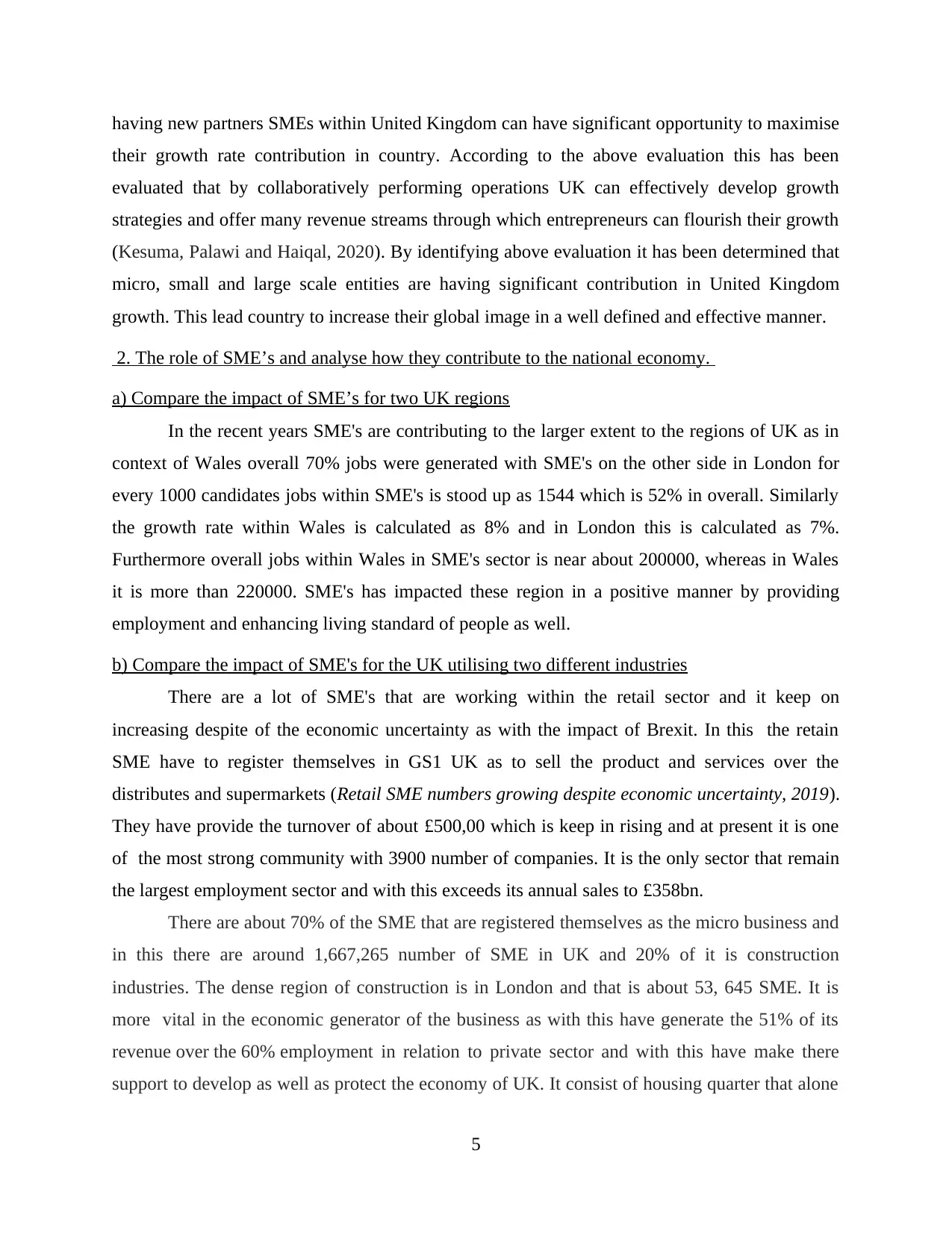
having new partners SMEs within United Kingdom can have significant opportunity to maximise
their growth rate contribution in country. According to the above evaluation this has been
evaluated that by collaboratively performing operations UK can effectively develop growth
strategies and offer many revenue streams through which entrepreneurs can flourish their growth
(Kesuma, Palawi and Haiqal, 2020). By identifying above evaluation it has been determined that
micro, small and large scale entities are having significant contribution in United Kingdom
growth. This lead country to increase their global image in a well defined and effective manner.
2. The role of SME’s and analyse how they contribute to the national economy.
a) Compare the impact of SME’s for two UK regions
In the recent years SME's are contributing to the larger extent to the regions of UK as in
context of Wales overall 70% jobs were generated with SME's on the other side in London for
every 1000 candidates jobs within SME's is stood up as 1544 which is 52% in overall. Similarly
the growth rate within Wales is calculated as 8% and in London this is calculated as 7%.
Furthermore overall jobs within Wales in SME's sector is near about 200000, whereas in Wales
it is more than 220000. SME's has impacted these region in a positive manner by providing
employment and enhancing living standard of people as well.
b) Compare the impact of SME's for the UK utilising two different industries
There are a lot of SME's that are working within the retail sector and it keep on
increasing despite of the economic uncertainty as with the impact of Brexit. In this the retain
SME have to register themselves in GS1 UK as to sell the product and services over the
distributes and supermarkets (Retail SME numbers growing despite economic uncertainty, 2019).
They have provide the turnover of about £500,00 which is keep in rising and at present it is one
of the most strong community with 3900 number of companies. It is the only sector that remain
the largest employment sector and with this exceeds its annual sales to £358bn.
There are about 70% of the SME that are registered themselves as the micro business and
in this there are around 1,667,265 number of SME in UK and 20% of it is construction
industries. The dense region of construction is in London and that is about 53, 645 SME. It is
more vital in the economic generator of the business as with this have generate the 51% of its
revenue over the 60% employment in relation to private sector and with this have make there
support to develop as well as protect the economy of UK. It consist of housing quarter that alone
5
their growth rate contribution in country. According to the above evaluation this has been
evaluated that by collaboratively performing operations UK can effectively develop growth
strategies and offer many revenue streams through which entrepreneurs can flourish their growth
(Kesuma, Palawi and Haiqal, 2020). By identifying above evaluation it has been determined that
micro, small and large scale entities are having significant contribution in United Kingdom
growth. This lead country to increase their global image in a well defined and effective manner.
2. The role of SME’s and analyse how they contribute to the national economy.
a) Compare the impact of SME’s for two UK regions
In the recent years SME's are contributing to the larger extent to the regions of UK as in
context of Wales overall 70% jobs were generated with SME's on the other side in London for
every 1000 candidates jobs within SME's is stood up as 1544 which is 52% in overall. Similarly
the growth rate within Wales is calculated as 8% and in London this is calculated as 7%.
Furthermore overall jobs within Wales in SME's sector is near about 200000, whereas in Wales
it is more than 220000. SME's has impacted these region in a positive manner by providing
employment and enhancing living standard of people as well.
b) Compare the impact of SME's for the UK utilising two different industries
There are a lot of SME's that are working within the retail sector and it keep on
increasing despite of the economic uncertainty as with the impact of Brexit. In this the retain
SME have to register themselves in GS1 UK as to sell the product and services over the
distributes and supermarkets (Retail SME numbers growing despite economic uncertainty, 2019).
They have provide the turnover of about £500,00 which is keep in rising and at present it is one
of the most strong community with 3900 number of companies. It is the only sector that remain
the largest employment sector and with this exceeds its annual sales to £358bn.
There are about 70% of the SME that are registered themselves as the micro business and
in this there are around 1,667,265 number of SME in UK and 20% of it is construction
industries. The dense region of construction is in London and that is about 53, 645 SME. It is
more vital in the economic generator of the business as with this have generate the 51% of its
revenue over the 60% employment in relation to private sector and with this have make there
support to develop as well as protect the economy of UK. It consist of housing quarter that alone
5
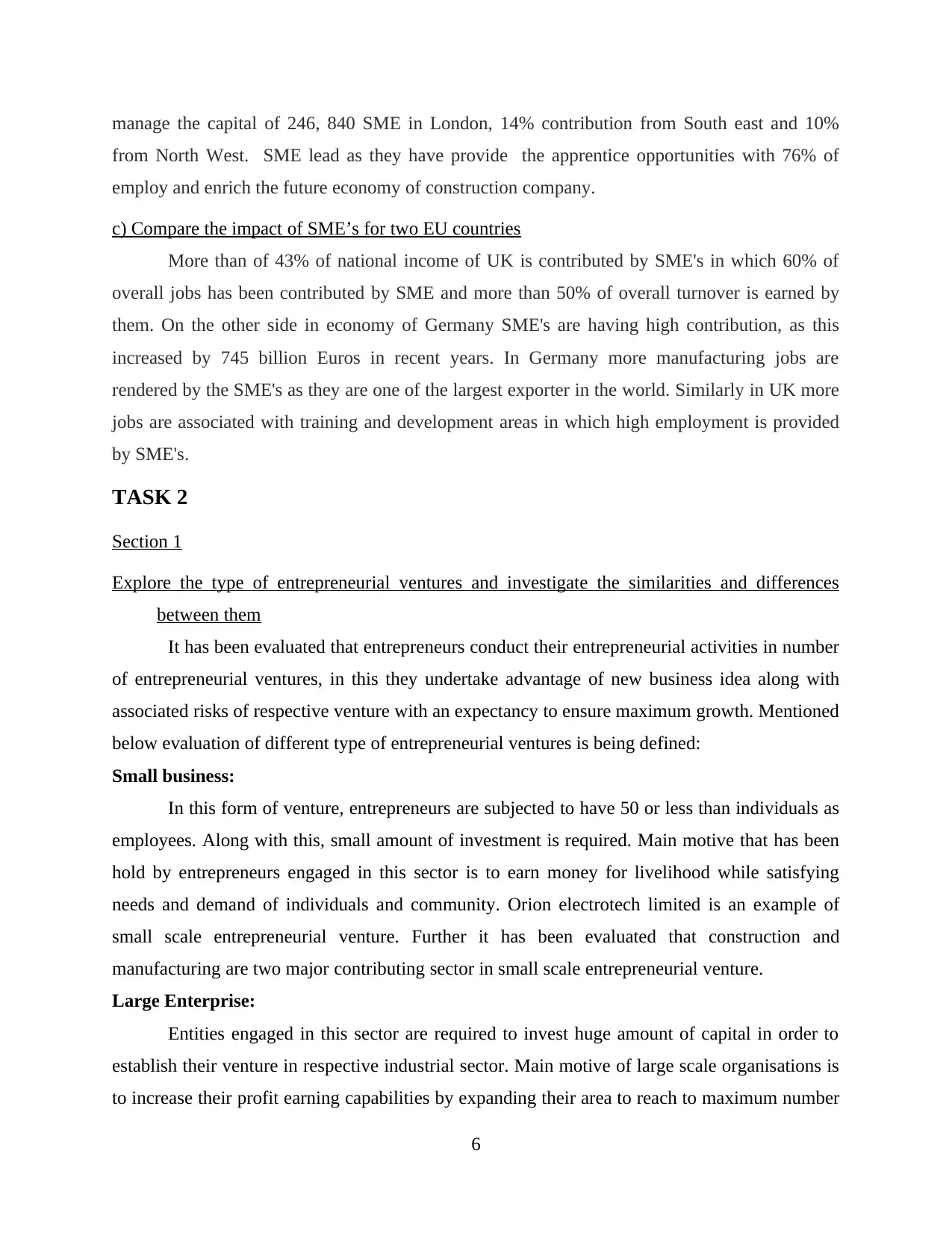
manage the capital of 246, 840 SME in London, 14% contribution from South east and 10%
from North West. SME lead as they have provide the apprentice opportunities with 76% of
employ and enrich the future economy of construction company.
c) Compare the impact of SME’s for two EU countries
More than of 43% of national income of UK is contributed by SME's in which 60% of
overall jobs has been contributed by SME and more than 50% of overall turnover is earned by
them. On the other side in economy of Germany SME's are having high contribution, as this
increased by 745 billion Euros in recent years. In Germany more manufacturing jobs are
rendered by the SME's as they are one of the largest exporter in the world. Similarly in UK more
jobs are associated with training and development areas in which high employment is provided
by SME's.
TASK 2
Section 1
Explore the type of entrepreneurial ventures and investigate the similarities and differences
between them
It has been evaluated that entrepreneurs conduct their entrepreneurial activities in number
of entrepreneurial ventures, in this they undertake advantage of new business idea along with
associated risks of respective venture with an expectancy to ensure maximum growth. Mentioned
below evaluation of different type of entrepreneurial ventures is being defined:
Small business:
In this form of venture, entrepreneurs are subjected to have 50 or less than individuals as
employees. Along with this, small amount of investment is required. Main motive that has been
hold by entrepreneurs engaged in this sector is to earn money for livelihood while satisfying
needs and demand of individuals and community. Orion electrotech limited is an example of
small scale entrepreneurial venture. Further it has been evaluated that construction and
manufacturing are two major contributing sector in small scale entrepreneurial venture.
Large Enterprise:
Entities engaged in this sector are required to invest huge amount of capital in order to
establish their venture in respective industrial sector. Main motive of large scale organisations is
to increase their profit earning capabilities by expanding their area to reach to maximum number
6
from North West. SME lead as they have provide the apprentice opportunities with 76% of
employ and enrich the future economy of construction company.
c) Compare the impact of SME’s for two EU countries
More than of 43% of national income of UK is contributed by SME's in which 60% of
overall jobs has been contributed by SME and more than 50% of overall turnover is earned by
them. On the other side in economy of Germany SME's are having high contribution, as this
increased by 745 billion Euros in recent years. In Germany more manufacturing jobs are
rendered by the SME's as they are one of the largest exporter in the world. Similarly in UK more
jobs are associated with training and development areas in which high employment is provided
by SME's.
TASK 2
Section 1
Explore the type of entrepreneurial ventures and investigate the similarities and differences
between them
It has been evaluated that entrepreneurs conduct their entrepreneurial activities in number
of entrepreneurial ventures, in this they undertake advantage of new business idea along with
associated risks of respective venture with an expectancy to ensure maximum growth. Mentioned
below evaluation of different type of entrepreneurial ventures is being defined:
Small business:
In this form of venture, entrepreneurs are subjected to have 50 or less than individuals as
employees. Along with this, small amount of investment is required. Main motive that has been
hold by entrepreneurs engaged in this sector is to earn money for livelihood while satisfying
needs and demand of individuals and community. Orion electrotech limited is an example of
small scale entrepreneurial venture. Further it has been evaluated that construction and
manufacturing are two major contributing sector in small scale entrepreneurial venture.
Large Enterprise:
Entities engaged in this sector are required to invest huge amount of capital in order to
establish their venture in respective industrial sector. Main motive of large scale organisations is
to increase their profit earning capabilities by expanding their area to reach to maximum number
6
⊘ This is a preview!⊘
Do you want full access?
Subscribe today to unlock all pages.

Trusted by 1+ million students worldwide
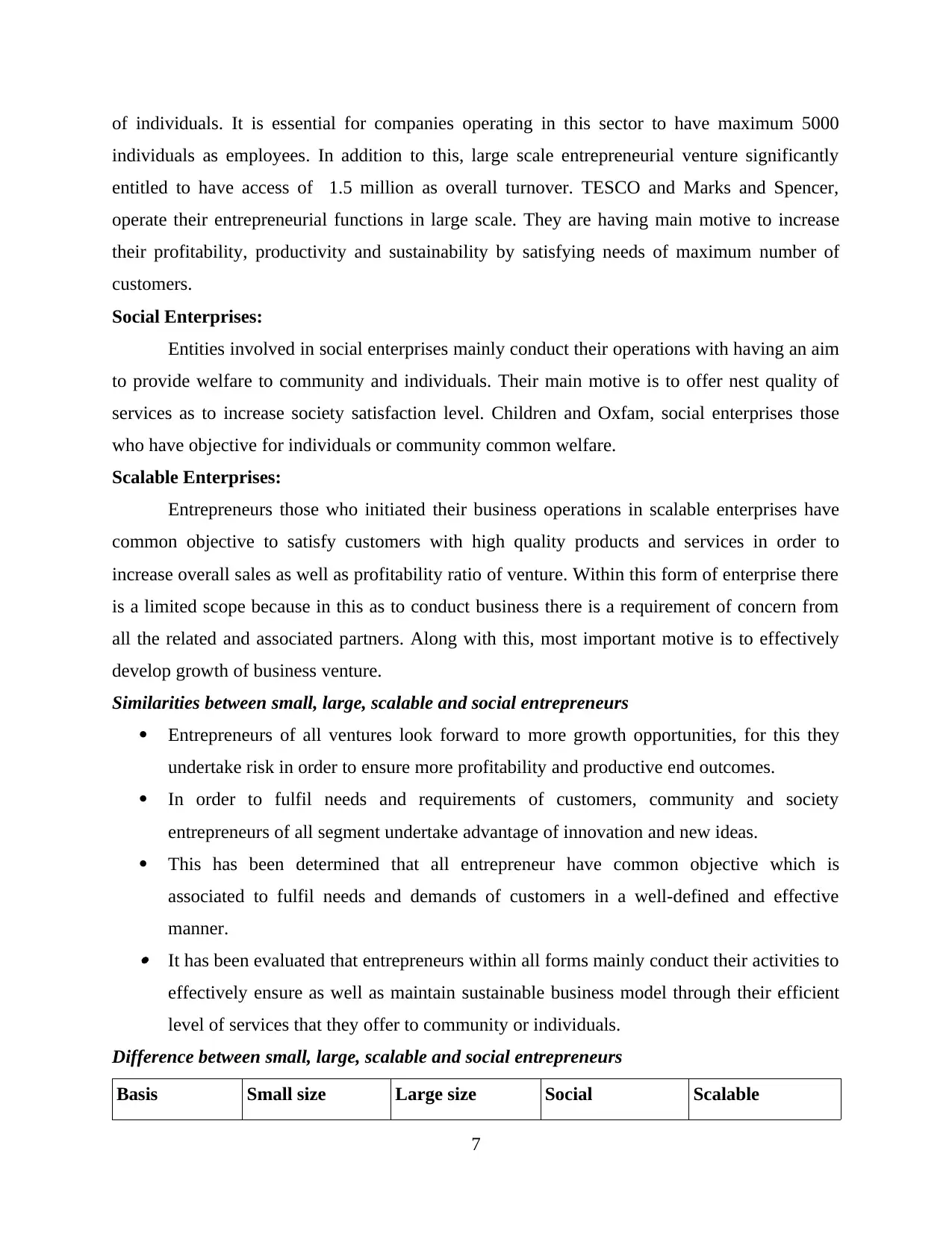
of individuals. It is essential for companies operating in this sector to have maximum 5000
individuals as employees. In addition to this, large scale entrepreneurial venture significantly
entitled to have access of 1.5 million as overall turnover. TESCO and Marks and Spencer,
operate their entrepreneurial functions in large scale. They are having main motive to increase
their profitability, productivity and sustainability by satisfying needs of maximum number of
customers.
Social Enterprises:
Entities involved in social enterprises mainly conduct their operations with having an aim
to provide welfare to community and individuals. Their main motive is to offer nest quality of
services as to increase society satisfaction level. Children and Oxfam, social enterprises those
who have objective for individuals or community common welfare.
Scalable Enterprises:
Entrepreneurs those who initiated their business operations in scalable enterprises have
common objective to satisfy customers with high quality products and services in order to
increase overall sales as well as profitability ratio of venture. Within this form of enterprise there
is a limited scope because in this as to conduct business there is a requirement of concern from
all the related and associated partners. Along with this, most important motive is to effectively
develop growth of business venture.
Similarities between small, large, scalable and social entrepreneurs
Entrepreneurs of all ventures look forward to more growth opportunities, for this they
undertake risk in order to ensure more profitability and productive end outcomes.
In order to fulfil needs and requirements of customers, community and society
entrepreneurs of all segment undertake advantage of innovation and new ideas.
This has been determined that all entrepreneur have common objective which is
associated to fulfil needs and demands of customers in a well-defined and effective
manner. It has been evaluated that entrepreneurs within all forms mainly conduct their activities to
effectively ensure as well as maintain sustainable business model through their efficient
level of services that they offer to community or individuals.
Difference between small, large, scalable and social entrepreneurs
Basis Small size Large size Social Scalable
7
individuals as employees. In addition to this, large scale entrepreneurial venture significantly
entitled to have access of 1.5 million as overall turnover. TESCO and Marks and Spencer,
operate their entrepreneurial functions in large scale. They are having main motive to increase
their profitability, productivity and sustainability by satisfying needs of maximum number of
customers.
Social Enterprises:
Entities involved in social enterprises mainly conduct their operations with having an aim
to provide welfare to community and individuals. Their main motive is to offer nest quality of
services as to increase society satisfaction level. Children and Oxfam, social enterprises those
who have objective for individuals or community common welfare.
Scalable Enterprises:
Entrepreneurs those who initiated their business operations in scalable enterprises have
common objective to satisfy customers with high quality products and services in order to
increase overall sales as well as profitability ratio of venture. Within this form of enterprise there
is a limited scope because in this as to conduct business there is a requirement of concern from
all the related and associated partners. Along with this, most important motive is to effectively
develop growth of business venture.
Similarities between small, large, scalable and social entrepreneurs
Entrepreneurs of all ventures look forward to more growth opportunities, for this they
undertake risk in order to ensure more profitability and productive end outcomes.
In order to fulfil needs and requirements of customers, community and society
entrepreneurs of all segment undertake advantage of innovation and new ideas.
This has been determined that all entrepreneur have common objective which is
associated to fulfil needs and demands of customers in a well-defined and effective
manner. It has been evaluated that entrepreneurs within all forms mainly conduct their activities to
effectively ensure as well as maintain sustainable business model through their efficient
level of services that they offer to community or individuals.
Difference between small, large, scalable and social entrepreneurs
Basis Small size Large size Social Scalable
7
Paraphrase This Document
Need a fresh take? Get an instant paraphrase of this document with our AI Paraphraser
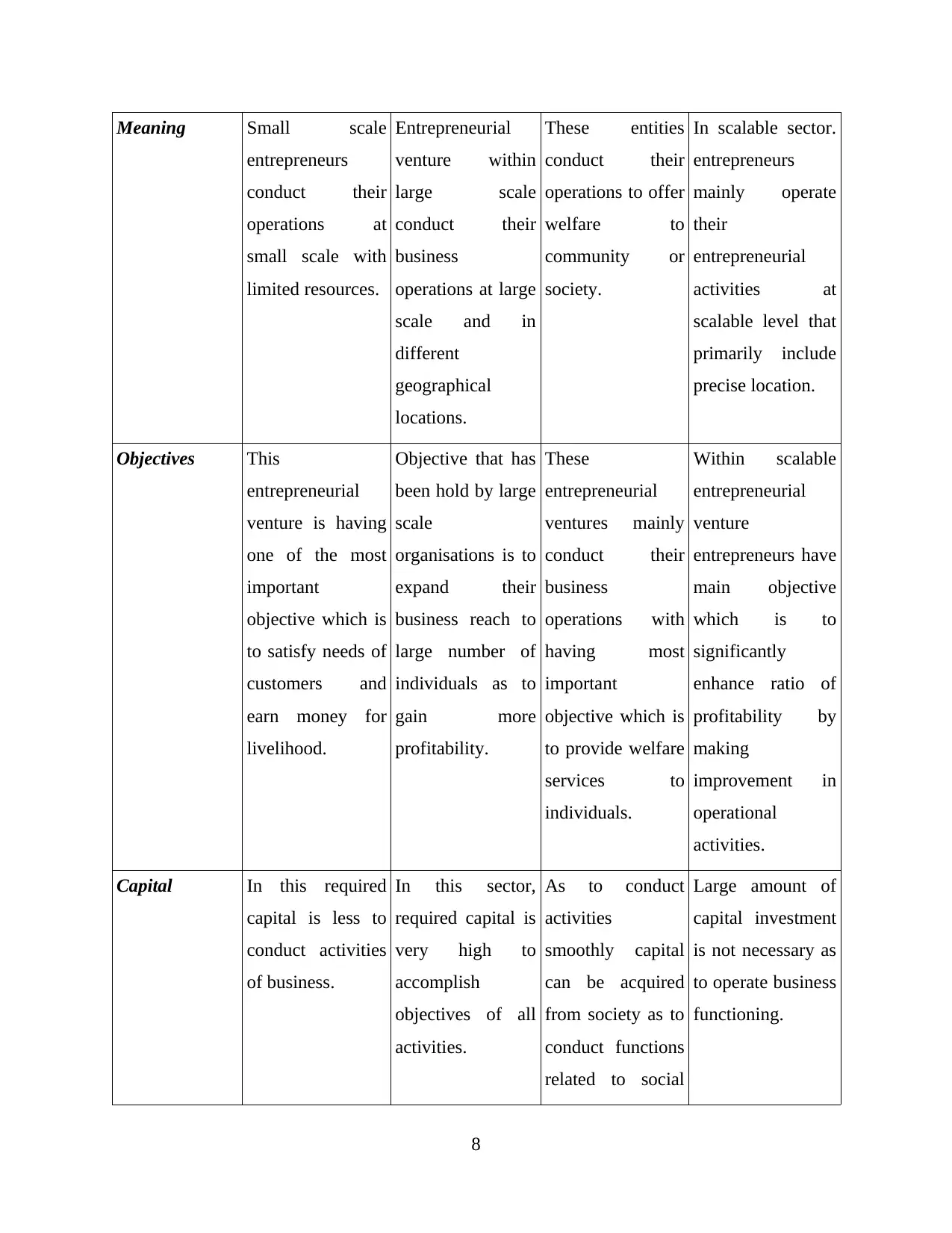
Meaning Small scale
entrepreneurs
conduct their
operations at
small scale with
limited resources.
Entrepreneurial
venture within
large scale
conduct their
business
operations at large
scale and in
different
geographical
locations.
These entities
conduct their
operations to offer
welfare to
community or
society.
In scalable sector.
entrepreneurs
mainly operate
their
entrepreneurial
activities at
scalable level that
primarily include
precise location.
Objectives This
entrepreneurial
venture is having
one of the most
important
objective which is
to satisfy needs of
customers and
earn money for
livelihood.
Objective that has
been hold by large
scale
organisations is to
expand their
business reach to
large number of
individuals as to
gain more
profitability.
These
entrepreneurial
ventures mainly
conduct their
business
operations with
having most
important
objective which is
to provide welfare
services to
individuals.
Within scalable
entrepreneurial
venture
entrepreneurs have
main objective
which is to
significantly
enhance ratio of
profitability by
making
improvement in
operational
activities.
Capital In this required
capital is less to
conduct activities
of business.
In this sector,
required capital is
very high to
accomplish
objectives of all
activities.
As to conduct
activities
smoothly capital
can be acquired
from society as to
conduct functions
related to social
Large amount of
capital investment
is not necessary as
to operate business
functioning.
8
entrepreneurs
conduct their
operations at
small scale with
limited resources.
Entrepreneurial
venture within
large scale
conduct their
business
operations at large
scale and in
different
geographical
locations.
These entities
conduct their
operations to offer
welfare to
community or
society.
In scalable sector.
entrepreneurs
mainly operate
their
entrepreneurial
activities at
scalable level that
primarily include
precise location.
Objectives This
entrepreneurial
venture is having
one of the most
important
objective which is
to satisfy needs of
customers and
earn money for
livelihood.
Objective that has
been hold by large
scale
organisations is to
expand their
business reach to
large number of
individuals as to
gain more
profitability.
These
entrepreneurial
ventures mainly
conduct their
business
operations with
having most
important
objective which is
to provide welfare
services to
individuals.
Within scalable
entrepreneurial
venture
entrepreneurs have
main objective
which is to
significantly
enhance ratio of
profitability by
making
improvement in
operational
activities.
Capital In this required
capital is less to
conduct activities
of business.
In this sector,
required capital is
very high to
accomplish
objectives of all
activities.
As to conduct
activities
smoothly capital
can be acquired
from society as to
conduct functions
related to social
Large amount of
capital investment
is not necessary as
to operate business
functioning.
8
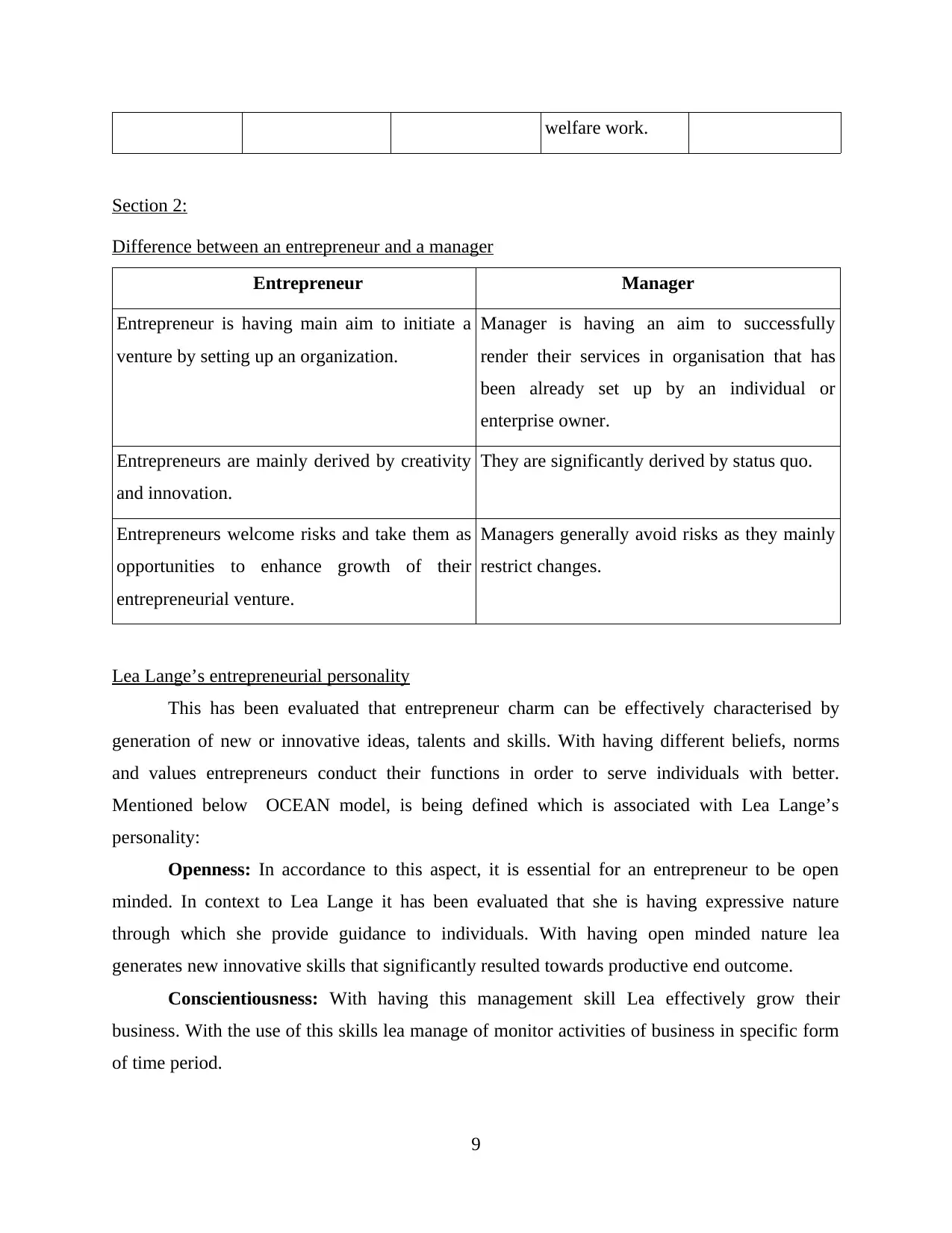
welfare work.
Section 2:
Difference between an entrepreneur and a manager
Entrepreneur Manager
Entrepreneur is having main aim to initiate a
venture by setting up an organization.
Manager is having an aim to successfully
render their services in organisation that has
been already set up by an individual or
enterprise owner.
Entrepreneurs are mainly derived by creativity
and innovation.
They are significantly derived by status quo.
Entrepreneurs welcome risks and take them as
opportunities to enhance growth of their
entrepreneurial venture.
Managers generally avoid risks as they mainly
restrict changes.
Lea Lange’s entrepreneurial personality
This has been evaluated that entrepreneur charm can be effectively characterised by
generation of new or innovative ideas, talents and skills. With having different beliefs, norms
and values entrepreneurs conduct their functions in order to serve individuals with better.
Mentioned below OCEAN model, is being defined which is associated with Lea Lange’s
personality:
Openness: In accordance to this aspect, it is essential for an entrepreneur to be open
minded. In context to Lea Lange it has been evaluated that she is having expressive nature
through which she provide guidance to individuals. With having open minded nature lea
generates new innovative skills that significantly resulted towards productive end outcome.
Conscientiousness: With having this management skill Lea effectively grow their
business. With the use of this skills lea manage of monitor activities of business in specific form
of time period.
9
Section 2:
Difference between an entrepreneur and a manager
Entrepreneur Manager
Entrepreneur is having main aim to initiate a
venture by setting up an organization.
Manager is having an aim to successfully
render their services in organisation that has
been already set up by an individual or
enterprise owner.
Entrepreneurs are mainly derived by creativity
and innovation.
They are significantly derived by status quo.
Entrepreneurs welcome risks and take them as
opportunities to enhance growth of their
entrepreneurial venture.
Managers generally avoid risks as they mainly
restrict changes.
Lea Lange’s entrepreneurial personality
This has been evaluated that entrepreneur charm can be effectively characterised by
generation of new or innovative ideas, talents and skills. With having different beliefs, norms
and values entrepreneurs conduct their functions in order to serve individuals with better.
Mentioned below OCEAN model, is being defined which is associated with Lea Lange’s
personality:
Openness: In accordance to this aspect, it is essential for an entrepreneur to be open
minded. In context to Lea Lange it has been evaluated that she is having expressive nature
through which she provide guidance to individuals. With having open minded nature lea
generates new innovative skills that significantly resulted towards productive end outcome.
Conscientiousness: With having this management skill Lea effectively grow their
business. With the use of this skills lea manage of monitor activities of business in specific form
of time period.
9
⊘ This is a preview!⊘
Do you want full access?
Subscribe today to unlock all pages.

Trusted by 1+ million students worldwide
1 out of 17
Related Documents
Your All-in-One AI-Powered Toolkit for Academic Success.
+13062052269
info@desklib.com
Available 24*7 on WhatsApp / Email
![[object Object]](/_next/static/media/star-bottom.7253800d.svg)
Unlock your academic potential
Copyright © 2020–2026 A2Z Services. All Rights Reserved. Developed and managed by ZUCOL.

